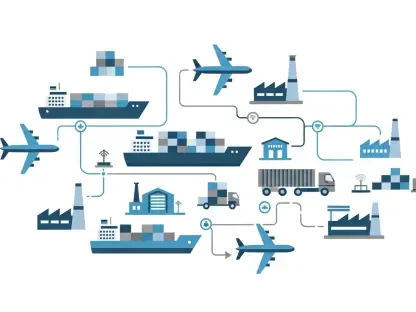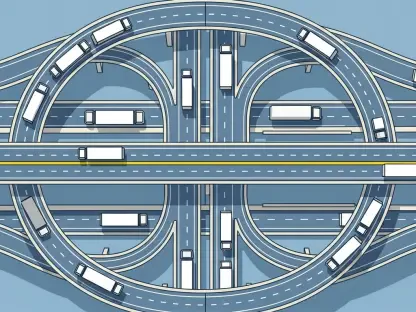The logistics industry faces a staggering challenge with a persistent shortage of truck drivers, requiring an estimated 40,000 new recruits annually over the next few years to keep supply chains moving. This gap threatens not only the flow of goods but also the stability of economies and everyday life, making it a critical issue to address. With an aging workforce retiring faster than replacements can be found, the question arises: could Generation Z, the cohort aged 16 to 25, be the solution? This roundup dives into diverse perspectives from industry leaders, surveys, and research to explore whether Gen Z’s tech-savviness and unique values can bridge this critical labor gap, offering fresh insights and actionable strategies for a sector at a crossroads.
The Driver Shortage Crisis and Gen Z’s Emerging Role
The scale of the truck driver shortage has become a pressing concern for logistics, with industry reports consistently highlighting the urgent need for new talent to prevent supply chain bottlenecks. Many stakeholders point out that without a steady influx of drivers, the cost of goods could rise, and delivery delays might become commonplace. This urgency has turned attention toward younger generations, particularly Gen Z, who are just entering the workforce with distinct skills and expectations.
Feedback from logistics forums suggests that this demographic could bring a much-needed shift, given their familiarity with digital tools and their desire for meaningful work. However, opinions vary on whether the industry is prepared to adapt to their needs. Some industry voices argue that the traditional image of trucking as a grueling, isolated job might deter even the most open-minded young workers unless significant changes are made.
A recurring theme in discussions is the potential for Gen Z to redefine the role of a truck driver by leveraging technology and prioritizing workplace culture. Reports indicate that their inclination toward innovation could help modernize an industry often seen as outdated. This roundup seeks to unpack these perspectives, weighing the optimism against the challenges to understand if this generation can truly fill the gap.
Diverse Views on Gen Z’s Attraction to Trucking Careers
Factors Pulling Gen Z into the Driver’s Seat
Surveys across the logistics sector reveal a surprising interest among Gen Z, with over half of respondents finding driving roles appealing due to flexible schedules and the promise of independence. Many young individuals value the chance to work outside conventional office settings, seeing trucking as a path to autonomy. Industry insights emphasize that decent pay and travel opportunities further sweeten the deal for a generation eager to explore non-traditional careers.
Additional input from fleet managers suggests that the allure of being on the road resonates with Gen Z’s desire for experiences over stability. They note that the ability to chart one’s own course, both literally and figuratively, aligns well with this group’s mindset. Yet, there’s a cautious tone in some analyses, questioning whether these attractions are enough to sustain long-term commitment in a demanding field.
Contrasting views emerge from training programs, where facilitators observe that while initial interest is high, deeper education about the role’s challenges sometimes dims enthusiasm. They stress the importance of transparent communication about the job’s realities to ensure that attraction translates into retention. This balance of appeal and realism remains a key point of debate among industry observers.
Challenges Blocking Gen Z’s Path to Trucking
On the flip side, numerous barriers deter Gen Z from embracing trucking as a career, with long hours and repetitive tasks often cited as major drawbacks. Feedback from career counseling sessions indicates that many young individuals perceive the job as monotonous, lacking the dynamic engagement they seek. This perception creates a significant hurdle for recruiters aiming to draw in fresh talent.
Industry roundtables also highlight the male-dominated culture of trucking as a persistent issue, potentially alienating diverse candidates who might otherwise consider the field. Some voices argue that outdated stereotypes about who belongs behind the wheel continue to shape public opinion, making the sector less inviting. These cultural dynamics are frequently discussed as a critical area for reform if recruitment is to improve.
A third perspective comes from logistics consultants who warn that failing to address these obstacles risks losing an entire generation of potential drivers. They advocate for rebranding efforts to showcase trucking as inclusive and adaptive, urging companies to tackle these issues head-on. The consensus is that without proactive change, the industry might miss a golden opportunity to tap into Gen Z’s potential.
Technology as a Magnet for Young Talent
Gen Z’s affinity for technology emerges as a powerful draw, with many expressing a preference for roles that incorporate advanced tools and AI-driven systems. Industry analyses note that innovations like digital co-pilot features transform the driving experience, making it more interactive and less isolating. This shift is seen as a game-changer by tech advocates within the sector who believe it can reposition trucking as a cutting-edge career.
Further insights from technology providers in logistics suggest that connected tools not only enhance efficiency but also appeal to a generation raised on smartphones and apps. They argue that showcasing these advancements in recruitment campaigns could significantly boost interest among tech-savvy youth. The excitement around automation and digital dashboards is often mentioned as a way to dispel notions of trucking as a low-tech field.
However, some traditionalists in the industry caution against over-reliance on tech as a recruitment tool, pointing out that not all young drivers may have access to or interest in high-tech systems. They emphasize the need for a balanced approach that also addresses practical training and support. This diversity of opinion underscores the complexity of using technology as the sole hook for Gen Z engagement.
Workplace Values Driving Gen Z’s Career Choices
Beyond tech, Gen Z places a high premium on workplace culture, with a majority prioritizing mental health support and sustainability in their job searches. Polls within the industry reveal that respect and recognition from employers are non-negotiable for many in this demographic. These values often clash with traditional logistics practices, sparking debate about how fleets can adapt to meet such expectations.
Input from human resources specialists in trucking companies suggests that initiatives like driver reward programs and community-building efforts could be key to retention. They highlight examples such as public acknowledgment of safe driving records as small but impactful ways to foster a sense of belonging. This focus on emotional and ethical alignment is seen as a fresh lens through which to view talent management.
Contrasting opinions come from some fleet operators who worry that catering to these values might strain budgets or disrupt established workflows. They question whether the industry can afford such cultural shifts while maintaining operational efficiency. Despite this skepticism, the broader discussion leans toward the idea that aligning with Gen Z’s ethics could serve as a unique selling point in a competitive labor market.
Strategies for Logistics to Engage Gen Z
Drawing from varied perspectives, it’s clear that Gen Z’s interest in trucking hinges on both flexibility and technological integration, though negative perceptions and cultural mismatches pose significant hurdles. Industry panels often stress the need for fleets to invest in modern tools that make the job more appealing to a digital-native generation. This technological push is frequently cited as a foundational step to attract young drivers.
Practical recommendations also include prioritizing mental health resources and creating recognition programs to build a supportive environment. Insights from recruitment experts suggest that showcasing stories of diverse drivers and promoting inclusivity can help dismantle outdated stereotypes. These strategies aim to address the value-driven expectations that Gen Z brings to the table, ensuring they feel seen and valued.
Another angle comes from logistics educators who advocate for partnerships between companies and vocational programs to introduce Gen Z to trucking early on. They propose mentorship initiatives and open houses to demystify the industry, fostering curiosity and connection. This blend of innovation, cultural reform, and outreach reflects the multifaceted approach needed to turn potential into reality in addressing the driver shortage.
Reflecting on the Roundup’s Insights
Looking back, this exploration of Gen Z’s role in solving the truck driver shortage revealed a spectrum of optimism and caution among industry voices. The enthusiasm for their tech-savviness and value-driven mindset stood out as a beacon of hope, while concerns about cultural barriers and job perceptions tempered expectations. These discussions painted a picture of an industry at a pivotal moment, balancing tradition with transformation.
As a next step, stakeholders should consider piloting programs that integrate advanced technology with robust support systems, testing how these resonate with young recruits. Fleets might also explore collaborations with educational institutions to build early pipelines of talent, ensuring a steady flow of interested drivers. Taking these actionable measures could help turn the insights gathered into tangible progress, paving the way for a revitalized workforce in logistics.









